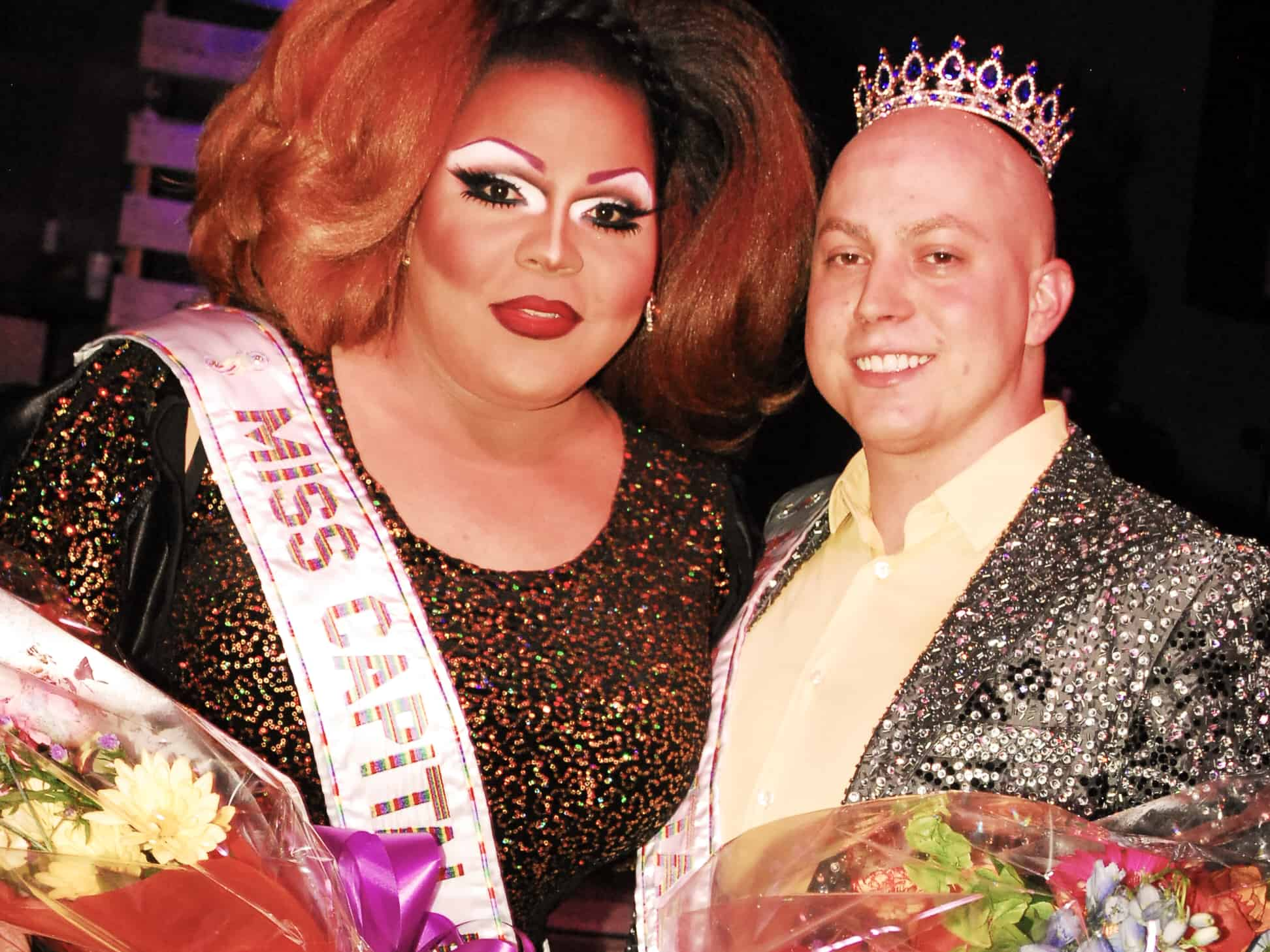Three women challenge Texas law barring transgender inmates from changing names
Plaintiffs' lawyer claims being unable to change their names violates his clients' Eighth Amendment rights
By John Riley on December 9, 2019 @JRileyMW

Three transgender women have filed a civil suit challenging a Texas law that prohibits current and former transgender federal prison inmates from legally changing their names to match their gender identity.
The lawsuit takes issue with a provision within the state’s Family Code that prohibits a name change within two years of a person’s discharge from prison, community supervision, or parole. During that time, any formerly incarcerated person must be referred to by their “deadname,” or the one assigned to them at birth — even if they otherwise fully transition.
The challenge to the law, which names Texas Gov. Greg Abbott and Attorney General Ken Paxton as defendants, alleges that it is not only discriminatory, but carries potentially bad ramifications for transgender individuals, including an increased risk of depression, increased feelings of gender dysphoria, and harassment at the hands of other inmates — who are often egged on or encouraged by prison officials’ refusal to acknowledge an inmate’s gender identity.
The suit also challenges the law’s application to anyone confined to a state-run facility who wishes to change their name, reports The Austin American-Statesman.
Abbott and Paxton’s offices have thus far declined to comment on the lawsuit.
According to the Trans Pride Initiative, Texas is among 10 states that restrict name changes based on a person’s conviction history.
While the Federal Bureau of Prisons released protocol in 2017 that outline provisions for changing transgender inmates’ names, name changes fall under the purview of state officials. As such, inmates in Texas are barred from having their name reflect their gender identity, while those in other states, like Connecticut, are allowed to legally change their names, without incident.
Each of the three plaintiffs in the case claims that they have been harmed or will be harmed by this restriction in the future.
Donna Langan, who is serving life without the possibility of parole in a federal facility in Carswell, argues that she has been unfairly barred from changing her name, even though the federal Bureau of Prisons acknowledges that she is transgender, keeps her housed in a women’s facility, and provides her with hormones to assist in her transition.
Teresa De Barbarac, an inmate at Federal Correctional Institution, Texarkana, who transitioned prior to her incarceration, alleges that she almost died because of the discrepancy between her name and her gender presentation after emergency medical technicians refused to touch her or assist her after realizing she was transgender.
Alexandra Carson, a former inmate who was recently released, says she is barred from changing her name until 2025 — two years after her parole ends. Unfortunately, in the meantime, because she cannot legally change her name or the gender marker on her official state ID and other documents, it makes it more difficult to maintain housing or a job without outing herself as transgender.
The incongruence between Carson’s official name and her gender identity also opens her up to fraud accusations from bank tellers, police officers and landlords, further complicating her ability to go about her daily life, reports the Texarkana Gazette.
According to the 2015 U.S. Trans Survey, 32% of transgender individuals with documentation not matching their gender identity reported that they had been verbally attacked, physically assaulted, or denied services and benefits for which they were otherwise eligible.
Brian McGiverin, an Austin civil rights attorney representing the women, has filed a petition with the U.S. District Court for the Western District of Texas asked U.S. District Judge Robert Pitman to strike down the 1995 act as unconstitutional, as it violates his clients’ Eight Amendment right to be free from “cruel and unusual punishment.”
In his brief, McGiverin compared the harmful psychological effects of being unable to obtain a name change with being placed in solitary confinement, writing: “Being misnamed and misgendered is a kind of intense gas-lighting that amounts to psychological torture.”
Read more:
Virginia Democrats, eager to deliver on campaign promises, introduce fair housing bill
Congressional Republicans introduce “fairness” bill with a host of religious exemptions
LGBTQ activists attack Pete Buttigieg for previously volunteering for the Salvation Army
The 2024 Capital Pride Pageant Seeks Contestants
The Capital Pride Alliance will host the contest for the next Mr., Mx., and Miss Capital Pride winners at Penn Social on April 26.
By John Riley on March 29, 2024 @JRileyMW
The Capital Pride Alliance has announced the return of the Mr., Mx., and Miss Capital Pride Pageant for 2024.
The pageant, which was held annually prior to the COVID-19 pandemic, welcomes contestants of any gender identity to compete for one of three crowns.
Contestants are judged on Pride-themed attire, talent, and answers to questions posed by a panel of judges.
Winners are expected to embody Capital Pride Alliance's commitment to diversity and inclusion, and use their platform, wit, and skills to encourage others to express their true selves and have their voices heard, especially when advocating for acceptance and equality.
Republican Disallowed from Marching in Miami Pride Parade
State Rep. Fabian Basabe, who voted for the 'Don't Say Gay' law, will sue Miami Beach Pride if not allowed to march in its parade.
By John Riley on April 8, 2024 @JRileyMW
Fabian Basabe, a Florida Republican lawmaker who supported the state's controversial "Don't Say Gay" bill, is threatening to sue Miami Beach Pride organizers if he is not allowed to participate in its annual parade on April 14.
The state representative claims that organizers' efforts to ban him from marching in the parade infringe on his First Amendment rights.
Last year, Basabe rode atop a convertible along the parade route, blowing kisses, waving, and yelling back at protesters who booed and chanted "Shame!" at him. Throughout, he was flanked by police in riot gear.
NCAA Sued for Allowing Trans Participation in College Sports
More than a dozen female athletes are suing the NCAA, alleging that transgender competitors in female sports violates Title IX.
By John Riley on March 20, 2024 @JRileyMW
More than a dozen female athletes have sued the National Collegiate Athletic Association over its transgender athlete participation policy.
The 16 female athletes bringing the lawsuit allege that the NCAA’s policy violates their civil rights under Title IX, a federal law that prohibits sex-based discrimination at any educational institution receiving federal funds.
Title IX has ensures that more schools provide athletic teams to women, thereby creating more opportunities to compete.
The athletes at the center of the lawsuit claim that transgender women who have undergone male puberty have a natural physiological advantage over cisgender women.
Support Metro Weekly’s Journalism
These are challenging times for news organizations. And yet it’s crucial we stay active and provide vital resources and information to both our local readers and the world. So won’t you please take a moment and consider supporting Metro Weekly with a membership? For as little as $5 a month, you can help ensure Metro Weekly magazine and MetroWeekly.com remain free, viable resources as we provide the best, most diverse, culturally-resonant LGBTQ coverage in both the D.C. region and around the world. Memberships come with exclusive perks and discounts, your own personal digital delivery of each week’s magazine (and an archive), access to our Member's Lounge when it launches this fall, and exclusive members-only items like Metro Weekly Membership Mugs and Tote Bags! Check out all our membership levels here and please join us today!
The Magazine
-
Most Popular
 California Mayor Recalled After Coming Out as Transgender
California Mayor Recalled After Coming Out as Transgender  LGBTQ Teen Sues School Over Suspension For Rap Lyrics
LGBTQ Teen Sues School Over Suspension For Rap Lyrics  Gay Furries Hack Right-Wing Network Real America's Voice
Gay Furries Hack Right-Wing Network Real America's Voice  Ralph Fiennes and Indira Varma Soar in STC's 'Macbeth' (Review)
Ralph Fiennes and Indira Varma Soar in STC's 'Macbeth' (Review)  Lawsuit Against New York AG Letitia James Dismissed
Lawsuit Against New York AG Letitia James Dismissed  The Powerful Story Behind David Archuleta's ‘Hell Together’
The Powerful Story Behind David Archuleta's ‘Hell Together’  Brandy Clark is Happily Settling into Americana
Brandy Clark is Happily Settling into Americana  Vera Drew is Not Joking Around with 'The People's Joker'
Vera Drew is Not Joking Around with 'The People's Joker'  For Don Mancini, Chucky is So Much More Than a Killer Toy
For Don Mancini, Chucky is So Much More Than a Killer Toy  Win Tickets to "Webster's Bitch" at The Keegan Theatre
Win Tickets to "Webster's Bitch" at The Keegan Theatre
 For Don Mancini, Chucky is So Much More Than a Killer Toy
For Don Mancini, Chucky is So Much More Than a Killer Toy  LGBTQ Teen Sues School Over Suspension For Rap Lyrics
LGBTQ Teen Sues School Over Suspension For Rap Lyrics  California Mayor Recalled After Coming Out as Transgender
California Mayor Recalled After Coming Out as Transgender  Lawsuit Against New York AG Letitia James Dismissed
Lawsuit Against New York AG Letitia James Dismissed  GLOW's Secret Garden Is An "Escape...With A Chill Vibe"
GLOW's Secret Garden Is An "Escape...With A Chill Vibe"  Ralph Fiennes and Indira Varma Soar in STC's 'Macbeth' (Review)
Ralph Fiennes and Indira Varma Soar in STC's 'Macbeth' (Review)  Win Tickets to "Webster's Bitch" at The Keegan Theatre
Win Tickets to "Webster's Bitch" at The Keegan Theatre  Vera Drew is Not Joking Around with 'The People's Joker'
Vera Drew is Not Joking Around with 'The People's Joker'  Gay Furries Hack Right-Wing Network Real America's Voice
Gay Furries Hack Right-Wing Network Real America's Voice  'Unknown Soldier' Makes for a Soaring Romance (Review)
'Unknown Soldier' Makes for a Soaring Romance (Review)
Scene
Metro Weekly
Washington's LGBTQ Magazine
P.O. Box 11559
Washington, DC 20008 (202) 638-6830
About Us pageFollow Us:
· Facebook
· Twitter
· Flipboard
· YouTube
· Instagram
· RSS News | RSS SceneArchives
- "We use cookies and other data collection technologies to provide the best experience for our customers. You may request that your data not be shared with third parties here: "Do Not Sell My Data
Copyright ©2024 Jansi LLC.









